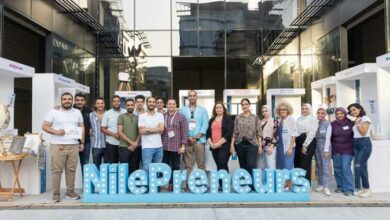Following an 18-month saga, Nile University students and faculty celebrated Sunday a court ruling that annulled an earlier decision to transfer the institution’s land and buildings to Nobel Laureate Ahmed Zewail.
The administrative court’s decision essentially means students and faculty can reclaim their campus in full, according to several sources who refuted media reports stating that the court only gave them rights to one building. The ruling also returned the rights to millions of Egyptian pounds worth of donations to the university.
“It is a long-awaited victory,” university Student Union President Ahmed Nassar told Egypt Independent.
The ruling annulled previous decisions taken by Ahmed Shafiq and Essam Sharaf, who consecutively served as prime ministers following Hosni Mubarak’s ouster, to hand over the land, labs and facilities over to the Zewail City project.
Students say bodyguards and security dogs are still stationed at the gates of the abandoned university.
“I hope the court decision is executed quickly so we can go back to our campus,” Nassar said, echoing the hopes of the wider student body.
Students and faculty have spoken out against the decision for months as the court case dragged on. For more than 80 days, they demonstrated outside the campus, and then staged a sit-in where they eventually set up tents and held lectures.
Sunday’s ruling came in response to a lawsuit filed by former MP Hamdy al-Fakhrany against the higher education minister, the prime minister and the former head of the Supreme Council of the Armed Forces seeking to cancel the transfer of land and facilities to Zewail City.
The demonstrators claimed that the Nile University administration had paid LE62 million for the right to use the campus for 99 years, and demanded that their campus remain in Zewail City and that they be allowed to use its laboratories and facilities.
Once the ruling is implemented, students and faculty can reclaim the 70 acres worth of land and buildings, while Zewail City will maintain control of 60 acres of adjacent unoccupied land.
“It would be very strange if Zewail appeals or decides not to execute the court ruling — it would mean that a Nobel Prize winner does not respect the rule of law,” Nassar said.
The court also rejected a request to turn the university from a private into a non-profit institution, according to Fatma Serag, a lawyer with the Academic Freedoms Program at the Association for Freedom of Thought and Expression, who has been following the case closely.
Before the 25 January 2011 revolt, Nile University’s Board of Trustees had requested to turn the private university into a non-profit, which was approved by the higher education minister and was pending a presidential decree.
The events of the uprising delayed the decree until Shafiq took office and gave the go-ahead for Zewail to take over the land and facilities, much to the surprise of the Nile University community.
“We do not want the university to remain privately owned. We do not want private entities to control its magnificent resources,” said Ahmed Mamdouh, a master’s student at the university.
“Turning it into a non-profit will place it under proper government supervision, and most of its unique educational resources will be for free. It is better if the university’s resources are administered by the people, and we will figure out how to pressure the executive authority to make the right decision,” he added.
Serag says this decision can be taken by the Cabinet or President Mohamed Morsy.
In September, security forces violently dispersed a sit-in, detaining five of the students who were later released by the Public Prosecution. Political forces and student movements heavily criticized the move as a grave crackdown on academic freedoms.
Students have described the former prime minister’s decision to hand the assets to Zewail as politicized, accusing Sharaf of favoring the Nobel laureate with whom he launched an NGO called the Era of Science in 2008.
They also say Zewail has no documents to prove his ownership of the land prior to the university’s establishment, labeling Shafiq and Sharaf’s decisions as invalid.
“We still fear that the executive authority may not execute the court order for political reasons or due to Zewail’s position. That’s why we will continue our sit-in until we are legally granted access to our campus,” Mamdouh said.




